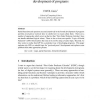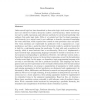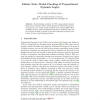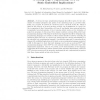193 search results - page 10 / 39 » On the Epistemological foundations of Logic Programming and ... |
109
Voted
ENTCS
2006
15 years 1 months ago
2006
Partial functions and operators are used extensively in the formal development of programs and thus development methods have to clarify how to reason about them. There are a numbe...
142
click to vote
SIGCSE
2000
ACM
15 years 6 months ago
2000
ACM
Classifying is a central activity in object-oriented programming and distinguishes it from procedural programming. Traditional logic, initiated by Aristotle, assigns classificatio...
118
click to vote
AI
2004
Springer
15 years 1 months ago
2004
Springer
Order-sorted logic has been formalized as first-order logic with sorted terms where sorts are ordered to build a hierarchy (called a sort-hierarchy). These sorted logics lead to u...
124
Voted
CSL
2006
Springer
15 years 1 months ago
2006
Springer
Model-checking problems for PDL (propositional dynamic logic) and its extension PDL (which includes the intersection operator on programs) over various classes of infinite state sy...
110
click to vote
FOSSACS
1999
Springer
15 years 6 months ago
1999
Springer
Abstract. A strong (L) logic programming language ([14, 15]) is given by two subclasses of formulas (programs and goals) of the underlying logic L, provided that: firstly, any pro...




